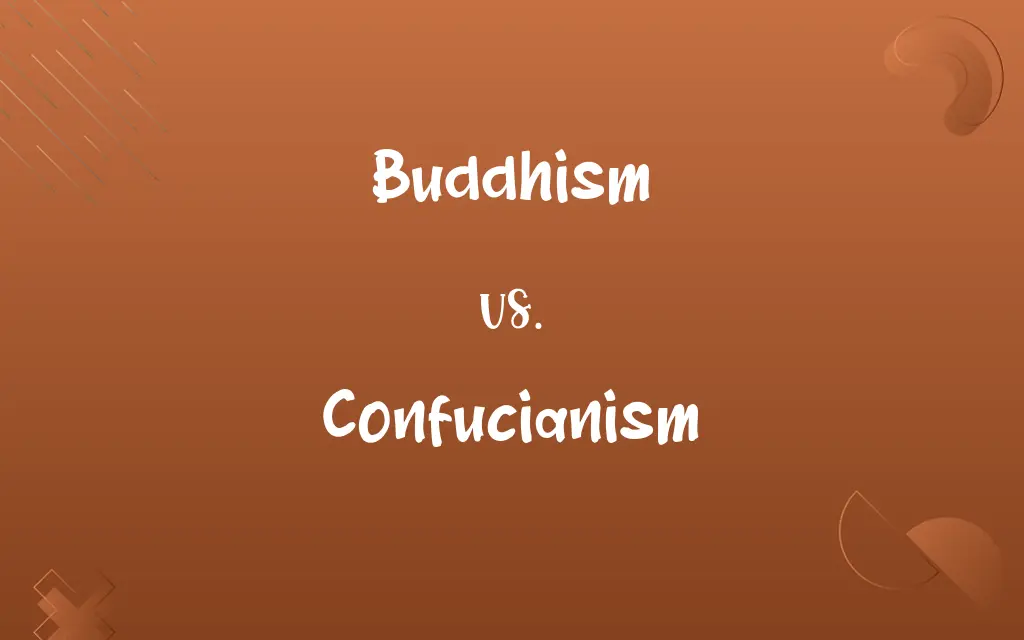Buddhism vs. Confucianism: Know the Difference

By Shumaila Saeed || Updated on December 25, 2023
Buddhism is personal spiritual growth and insight into life's true nature. Confucianism is a moral integrity, filial piety, and societal harmony.

Key Differences
Buddhism, originating in India, is centered on spiritual enlightenment and the cessation of suffering through the Eightfold Path and Four Noble Truths. Confucianism, originating in China, is not a religion but a philosophical system, focusing on proper conduct, social responsibility, and moral rectitude based on Confucius's teachings.
Shumaila Saeed
Dec 24, 2023
In Buddhism, the concept of reincarnation and karma plays a crucial role, where actions in this life affect one's future lives. Confucianism, conversely, does not emphasize an afterlife but focuses on ethical living and the importance of relationships in the here and now.
Shumaila Saeed
Dec 24, 2023
The teachings of Buddhism are encapsulated in the Tripitaka, a comprehensive collection of Buddha's teachings. Confucianism is grounded in texts like the Analects, emphasizing societal roles, etiquette, and filial piety.
Shumaila Saeed
Dec 24, 2023
Buddhism offers a path to Nirvana, a state of liberation and freedom from suffering, achievable through personal meditation and ethical living. Confucianism advocates for the cultivation of virtue and maintenance of ethics, primarily through education and reflection on one's role in society.
Shumaila Saeed
Dec 24, 2023
Buddhism is practiced through meditation, observance of moral precepts, and participation in religious rituals. In contrast, Confucianism is practiced through rituals emphasizing respect and responsibility, particularly in family and societal contexts.
Shumaila Saeed
Dec 24, 2023
ADVERTISEMENT
Comparison Chart
Core Belief
Liberation from suffering (Nirvana)
Moral integrity and societal order
Shumaila Saeed
Dec 24, 2023
Key Teachings
Four Noble Truths, Eightfold Path
Filial piety, social harmony
Shumaila Saeed
Dec 24, 2023
ADVERTISEMENT
Cultural Influence
Asia-wide, global spread
East Asia, philosophical influence
Shumaila Saeed
Dec 24, 2023
ADVERTISEMENT
Buddhism and Confucianism Definitions
Buddhism
A spiritual path that emphasizes ethical living and mindfulness to overcome suffering.
Buddhism teaches that compassion towards others reduces personal suffering.
Shumaila Saeed
Dec 14, 2023
Confucianism
An ethical doctrine focusing on filial piety, ritual propriety, and humaneness.
In Confucianism, societal order is maintained through structured relationships.
Shumaila Saeed
Dec 14, 2023
Buddhism
A religion based on the teachings of Buddha emphasizing the pursuit of enlightenment.
In Buddhism, meditation is a key practice for achieving inner peace.
Shumaila Saeed
Dec 14, 2023
Confucianism
Confucianism is a philosophy that promotes the idea of a just and harmonious society through ethical leadership and education.
Confucianism advocates for the moral development of leaders to benefit the greater community.
Shumaila Saeed
Dec 14, 2023
Buddhism
A philosophy that promotes balance, compassion, and detachment from desires.
The principles of Buddhism guide adherents in leading a moral life.
Shumaila Saeed
Dec 14, 2023
Confucianism
A philosophical system based on the teachings of Confucius emphasizing social harmony and moral living.
Confucianism stresses the importance of respecting one's elders and ancestors.
Shumaila Saeed
Dec 14, 2023
Buddhism
A tradition focusing on personal growth and understanding of the nature of reality.
Buddhism encourages individuals to reflect on the impermanence of life.
Shumaila Saeed
Dec 14, 2023
Confucianism
A tradition that promotes education, ethical behavior, and societal duty.
Confucianism values the role of education in shaping moral character.
Shumaila Saeed
Dec 14, 2023
Buddhism
A doctrine advocating for the liberation from the cycle of birth and rebirth.
Buddhism's concept of karma influences how adherents act in their daily lives.
Shumaila Saeed
Dec 14, 2023
Confucianism
Confucianism is a cultural tradition that places a strong emphasis on respecting authority and maintaining social order.
Confucianism values the proper conduct of individuals in their roles within society.
Shumaila Saeed
Dec 14, 2023
Buddhism
The teaching of Siddhartha Gautama that life is permeated with suffering caused by desire, that suffering ceases when desire ceases, and that enlightenment obtained through right conduct, wisdom, and meditation releases one from desire, suffering, and rebirth.
Shumaila Saeed
Dec 13, 2023
Confucianism
Of, relating to, or characteristic of Confucius, his teachings, or his followers.
Shumaila Saeed
Dec 13, 2023
Buddhism
The religion represented by the many groups, especially numerous in Asia, that profess varying forms of this doctrine and that venerate Siddhartha Gautama.
Shumaila Saeed
Dec 13, 2023
Buddhism
The religion based upon the doctrine originally taught by the Hindu sage Gautama Siddartha, surnamed Buddha, "the awakened or enlightened," in the sixth century b. c., and adopted as a religion by the greater part of the inhabitants of Central and Eastern Asia and the Indian Islands. Buddha's teaching is believed to have been atheistic; yet it was characterized by elevated humanity and morality. It presents release from existence (a beatific enfranchisement, Nirvâna) as the greatest good. Buddhists believe in transmigration of souls through all phases and forms of life. Their number was estimated in 1881 at 470,000,000.
Shumaila Saeed
Dec 13, 2023
Confucianism
The political morality taught by Confucius and his disciples, which forms the basis of the Chinese jurisprudence and education. It can hardly be called a religion, as it does not inculcate the worship of any god.
Shumaila Saeed
Dec 13, 2023
Buddhism
A religion represented by the many groups (especially in Asia) that profess various forms of the Buddhist doctrine and that venerate Buddha
Shumaila Saeed
Dec 13, 2023
Confucianism
The teachings of Confucius emphasizing love for humanity; high value given to learning and to devotion to family (including ancestors); peace; justice; influenced the traditional culture of China
Shumaila Saeed
Dec 13, 2023
Buddhism
The teaching of Buddha that life is permeated with suffering caused by desire, that suffering ceases when desire ceases, and that enlightenment obtained through right conduct and wisdom and meditation releases one from desire and suffering and rebirth
Shumaila Saeed
Dec 13, 2023
Repeatedly Asked Queries
What are the Four Noble Truths?
The Four Noble Truths are the core teachings of Buddhism. They address suffering, its causes, its cessation, and the path to liberation from suffering.
Shumaila Saeed
Dec 24, 2023
What is Nirvana in Buddhism?
Nirvana is the ultimate goal in Buddhism, representing liberation from suffering and the cycle of birth and death (samsara).
Shumaila Saeed
Dec 24, 2023
What is the Eightfold Path?
The Eightfold Path is a set of ethical and mental guidelines in Buddhism, leading to enlightenment and the end of suffering.
Shumaila Saeed
Dec 24, 2023
What are Buddhist meditation techniques?
Buddhist meditation techniques include mindfulness meditation (Vipassana), loving-kindness meditation (Metta), and Zen meditation (Zazen), among others.
Shumaila Saeed
Dec 24, 2023
What is the importance of filial piety in Confucianism?
Filial piety is a fundamental concept in Confucianism, emphasizing respect and obedience to one's parents and ancestors.
Shumaila Saeed
Dec 24, 2023
What is Buddhism?
Buddhism is a religion and philosophy that originated in India and focuses on the teachings of Siddhartha Gautama, also known as the Buddha.
Shumaila Saeed
Dec 24, 2023
Who was Siddhartha Gautama?
Siddhartha Gautama was the founder of Buddhism, commonly referred to as the Buddha. He lived in India in the 6th century BCE.
Shumaila Saeed
Dec 24, 2023
What is Confucianism?
Confucianism is a philosophical and ethical system founded by Confucius in ancient China, emphasizing morality, family values, and social harmony.
Shumaila Saeed
Dec 24, 2023
Who was Confucius?
Confucius (Kong Fuzi) was a Chinese philosopher and teacher who lived in the 6th century BCE and is the central figure in Confucianism.
Shumaila Saeed
Dec 24, 2023
What is the role of the Dalai Lama in Buddhism?
The Dalai Lama is a spiritual leader in Tibetan Buddhism and is considered the reincarnation of Avalokiteshvara, a bodhisattva of compassion.
Shumaila Saeed
Dec 24, 2023
Are there Confucian temples and rituals?
Yes, there are Confucian temples where people pay respects to Confucius and his teachings, but these are more cultural and educational than religious.
Shumaila Saeed
Dec 24, 2023
What is the significance of the Buddhist symbol, the Dharma Wheel?
The Dharma Wheel symbolizes the path to enlightenment and the teachings of the Buddha.
Shumaila Saeed
Dec 24, 2023
What is the concept of the "Mandate of Heaven" in Confucianism?
The Mandate of Heaven is a belief that rulers are granted authority by divine approval, but they must rule justly and ethically, or they will lose this mandate.
Shumaila Saeed
Dec 24, 2023
Are there different branches of Buddhism?
Yes, there are various schools and traditions within Buddhism, such as Theravada, Mahayana, and Vajrayana, each with its own interpretations and practices.
Shumaila Saeed
Dec 24, 2023
Do Buddhists worship gods?
Buddhism is non-theistic, meaning it does not involve the worship of deities. Instead, it focuses on personal development and enlightenment.
Shumaila Saeed
Dec 24, 2023
What is the Analects of Confucius?
The Analects are a collection of sayings and ideas attributed to Confucius and serve as a foundational text of Confucian thought.
Shumaila Saeed
Dec 24, 2023
Is Confucianism a religion?
Confucianism is often considered a philosophy and ethical system rather than a religion because it does not involve worship of deities or the afterlife.
Shumaila Saeed
Dec 24, 2023
What are the core Confucian virtues?
The core Confucian virtues are benevolence (ren), righteousness (yi), propriety (li), wisdom (zhi), and fidelity (xin).
Shumaila Saeed
Dec 24, 2023
How does Confucianism influence Chinese society today?
Confucian values continue to influence Chinese culture, education, and governance, emphasizing respect for authority, social harmony, and moral conduct.
Shumaila Saeed
Dec 24, 2023
Is Confucianism practiced outside of China?
Yes, Confucianism has also influenced other East Asian countries like Korea, Japan, and Vietnam, and continues to have cultural significance beyond China.
Shumaila Saeed
Dec 24, 2023
Share this page
Link for your blog / website
HTML
Link to share via messenger
About Author
Written by
Shumaila SaeedShumaila Saeed, an expert content creator with 6 years of experience, specializes in distilling complex topics into easily digestible comparisons, shining a light on the nuances that both inform and educate readers with clarity and accuracy.






































































